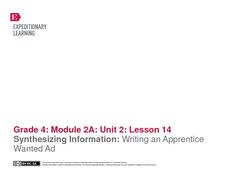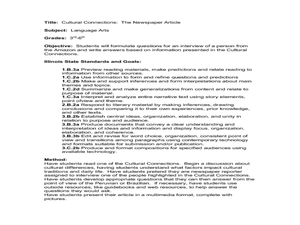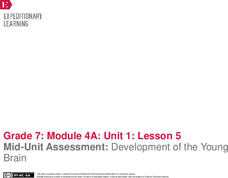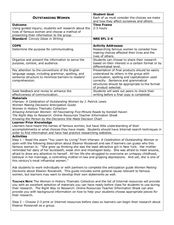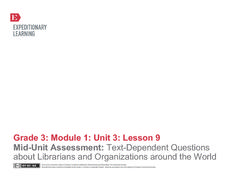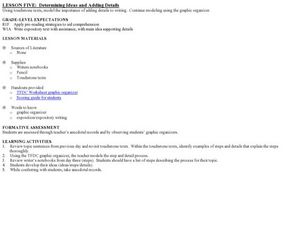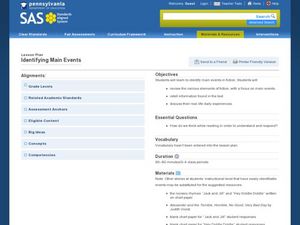Baruch College Writing Center
Summarizing, Paraphrasing, and Quoting Workshop
What's the difference between summarizing and paraphrasing? Show class members how to find the main ideas from informational text and condense it, restate it, or quote it directly with a series of educational activities based on two...
EngageNY
Synthesizing Information: Writing an Apprentice Wanted Ad
Fourth graders view examples of help-wanted ads as they plan and create their own writing in the fourteenth instructional activity of this unit on colonial trade. The engagement of the class is captured when the teacher shares an actual...
Curated OER
Only the Facts
Practice the strategy of summarizing to gain meaning and knowledge from an informational text. Young readers highlight supporting details and main ideas, and then they use this to summarize two articles: "The Great Quake" and "What is an...
Curated OER
Researching the Past
Learners research the western movement in order to learn note taking strategies with nonfiction texts. They use the Internet to search for important information about the western movement using the Cornell Notes note-taking system. They...
Curated OER
The Newspaper Article
Have your class participate in an interview activity using an informational text about the Amazon. After reading a Cultural Connections story about a person from the Amazon, middle schoolers write interview questions based on the text....
Curated OER
What Was That All About?
Through direct instruction, the teacher demonstrates how to identify the main idea and supporting details of a text when creating a summary. As a class, read a paragraph, highlighting relevant information and crossing out extraneous...
EngageNY
Taking Notes Using a Graphic Organizer: Inferring About the Importance of Religion in Colonial America
Improve class understanding of colonial times by reading an informational text and filling out the accompanying graphic organizer. Class members work with a partner to read, take notes, make inferences, and synthesize information.The...
EngageNY
Researching Part 2: Reading for Gist and Gathering Evidence Using the Researcher’s Notebook
The gist should be short and sweet! Pupils practice finding the gist of an informational text and then write a summary of the text. Next, they gather with their research teams to discuss a focus question based on the novel Bud, Not Buddy...
EngageNY
Mid-Unit Assessment: Development of the Young Brain
Scholars view a video clip about adolescent brain development and work with partners to identify the main idea and supporting details. Next, as part of the mid-unit assessment, pupils watch another clip from the video and complete a main...
Curated OER
Outstanding Women
Research the lives of famous women in this social studies lesson plan. Middle schoolers use various sources to research a famous woman and create a presentation about the accomplishments of the woman. They can find the central idea...
EngageNY
Identifying Main Ideas and Supporting Details: What’s Going On in the Teenage Brain?
What's going on in the teen brain? Pupils consider the question as they continue reading an informational article about the topic. While reading, they use a Thinking Log worksheet and an anchor chart to track their understanding of...
EngageNY
Mid-Unit Assessment: Answering Text-Dependent Questions About Librarians and Organizations Around the World
This is a skills-based assessment that asks test takers to use textual evidence to determine the main idea of an excerpt from an informational text as well as respond to text-dependent questions. The assessment is the middle point...
Curated OER
Classifying Information About Main Idea
In this reading for understanding instructional activity, students underline information in a text that is important in identifying the main idea. This instructional activity provides good practice for students who usually have...
Curated OER
Main Idea and Supporting Details
Students identify main idea and supporting details from a short reading selection using a two-column note taking process. In this literacy lesson, students work in groups of three to four, then compare their papers with the other groups'...
EngageNY
Taking Notes and Citing Quotes from Text: Gathering Information on our Rainforest Insects
In other words. Scholars practice using paraphrasing and quotes. They partner in pairs to write a paraphrase for an information text strip. Individuals then use their skills to paraphrase information from the text Fire Ants.
Curated OER
Determining Ideas and Adding Details
A handy TFDC (topic/fact/detail/conclusion) graphic organizer (included) allows young writers to outline and record their main ideas and supporting details in the prewriting phase. They then continue to add details to the topic sentences...
Curated OER
Use Details from Text to Identify Cause and Effect, Draw Conclusions, Compare and Contrast
Third graders discuss research topics and write a paragraph on one of the provided questions. They focus on including key words from charts that the class has been compiling. They underline supporting details within the text they write....
Curated OER
Classifying Defending Information about Main Idea
Students read and highlight important information gathered from text. In this reading strategies lesson, students define classify and then classify the important information they find. Students share and reflect on their answers.
Curated OER
Identifying Main Events
Help kindergartners learn to identify the main events in fiction. They will review elements of fiction, retell information found in the text, and discuss their real-life daily experiences. All the while, they will be asking themselves...
EngageNY
End of Unit 1 Assessment: Inferring and Synthesizing (From Two Texts) About Life in Colonial America
Close your colonial America unit with a performance-based assessment. Class members will show their proficiency in several skills including using details to back up inferences, determining the meaning of words in context,...
Curated OER
Understanding Cause and Effect
Identify the author's organizational pattern for expressing ideas. After reading an article on the California Gold Rush, middle schoolers determine the author's purpose for writing a passage of informational text. A full list of...
Curated OER
What a Relief!
How are disasters addressed by the Federal Government? This New York Times lesson, based on the article "Disaster Aid: The Mix of Mercy and Politics," prompts middle schoolers to discuss the idea of using a disaster declaration as a...
Curated OER
Shorten the Length
Learn how to summarize by identifying main ideas and supporting details. Readers cross out unimportant information as they read through a text. Is it a random detail? Cross it out! They then draw a concept map, placing the main idea in...
Curated OER
Summarizing with James and the Giant Peach
Elementary readers in literature groups practice summarizing chapter-by-chapter with Roald Dahl's James and the Giant Peach. Focus on main idea, supporting details, and the 5 Ws. Unfortunately, a clever "peach" graphic organizer to which...



